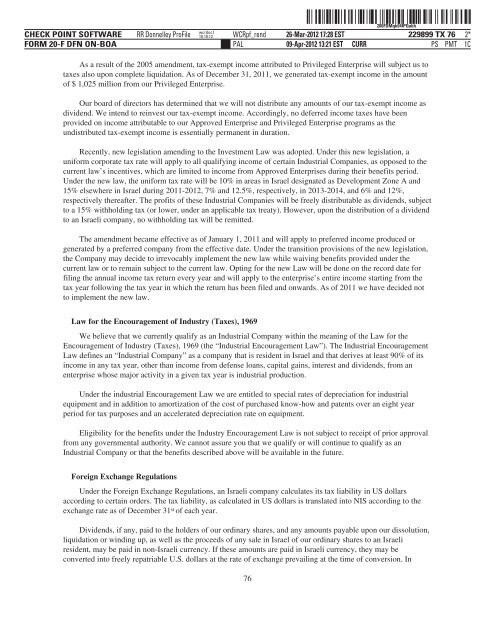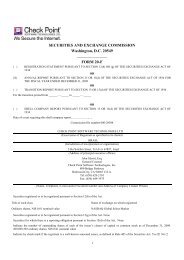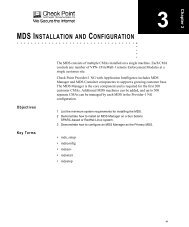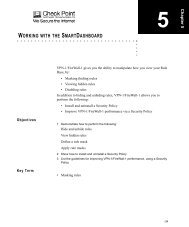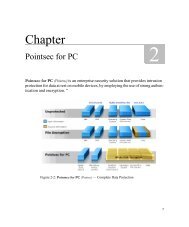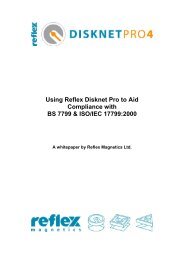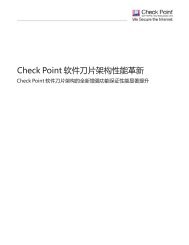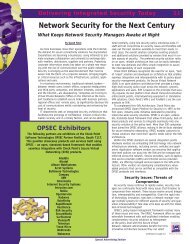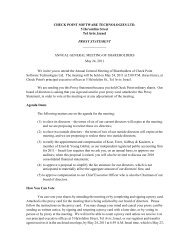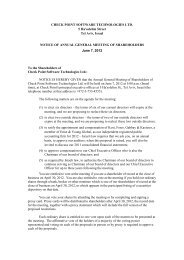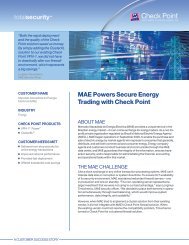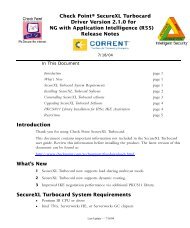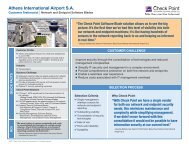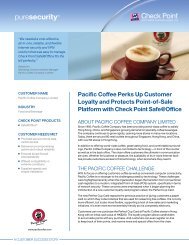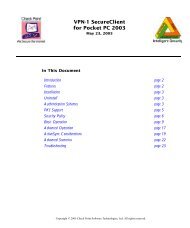printmgr file
printmgr file
printmgr file
You also want an ePaper? Increase the reach of your titles
YUMPU automatically turns print PDFs into web optimized ePapers that Google loves.
CHECK POINT SOFTWARE<br />
FORM 20-F DFN ON-BOA<br />
ˆ200FDMqk04fPQabhEŠ<br />
200FDMqk04fPQabh<br />
RR Donnelley ProFile wcrdoc1<br />
10.10.12 WCRpf_rend 26-Mar-2012 17:28 EST<br />
229899 TX 76 2*<br />
PAL<br />
09-Apr-2012 13:21 EST CURR<br />
PS PMT 1C<br />
As a result of the 2005 amendment, tax-exempt income attributed to Privileged Enterprise will subject us to<br />
taxes also upon complete liquidation. As of December 31, 2011, we generated tax-exempt income in the amount<br />
of $ 1,025 million from our Privileged Enterprise.<br />
Our board of directors has determined that we will not distribute any amounts of our tax-exempt income as<br />
dividend. We intend to reinvest our tax-exempt income. Accordingly, no deferred income taxes have been<br />
provided on income attributable to our Approved Enterprise and Privileged Enterprise programs as the<br />
undistributed tax-exempt income is essentially permanent in duration.<br />
Recently, new legislation amending to the Investment Law was adopted. Under this new legislation, a<br />
uniform corporate tax rate will apply to all qualifying income of certain Industrial Companies, as opposed to the<br />
current law’s incentives, which are limited to income from Approved Enterprises during their benefits period.<br />
Under the new law, the uniform tax rate will be 10% in areas in Israel designated as Development Zone A and<br />
15% elsewhere in Israel during 2011-2012, 7% and 12.5%, respectively, in 2013-2014, and 6% and 12%,<br />
respectively thereafter. The profits of these Industrial Companies will be freely distributable as dividends, subject<br />
to a 15% withholding tax (or lower, under an applicable tax treaty). However, upon the distribution of a dividend<br />
to an Israeli company, no withholding tax will be remitted.<br />
The amendment became effective as of January 1, 2011 and will apply to preferred income produced or<br />
generated by a preferred company from the effective date. Under the transition provisions of the new legislation,<br />
the Company may decide to irrevocably implement the new law while waiving benefits provided under the<br />
current law or to remain subject to the current law. Opting for the new Law will be done on the record date for<br />
filing the annual income tax return every year and will apply to the enterprise’s entire income starting from the<br />
tax year following the tax year in which the return has been <strong>file</strong>d and onwards. As of 2011 we have decided not<br />
to implement the new law.<br />
Law for the Encouragement of Industry (Taxes), 1969<br />
We believe that we currently qualify as an Industrial Company within the meaning of the Law for the<br />
Encouragement of Industry (Taxes), 1969 (the “Industrial Encouragement Law”). The Industrial Encouragement<br />
Law defines an “Industrial Company” as a company that is resident in Israel and that derives at least 90% of its<br />
income in any tax year, other than income from defense loans, capital gains, interest and dividends, from an<br />
enterprise whose major activity in a given tax year is industrial production.<br />
Under the industrial Encouragement Law we are entitled to special rates of depreciation for industrial<br />
equipment and in addition to amortization of the cost of purchased know-how and patents over an eight year<br />
period for tax purposes and an accelerated depreciation rate on equipment.<br />
Eligibility for the benefits under the Industry Encouragement Law is not subject to receipt of prior approval<br />
from any governmental authority. We cannot assure you that we qualify or will continue to qualify as an<br />
Industrial Company or that the benefits described above will be available in the future.<br />
Foreign Exchange Regulations<br />
Under the Foreign Exchange Regulations, an Israeli company calculates its tax liability in US dollars<br />
according to certain orders. The tax liability, as calculated in US dollars is translated into NIS according to the<br />
exchange rate as of December 31st of each year.<br />
Dividends, if any, paid to the holders of our ordinary shares, and any amounts payable upon our dissolution,<br />
liquidation or winding up, as well as the proceeds of any sale in Israel of our ordinary shares to an Israeli<br />
resident, may be paid in non-Israeli currency. If these amounts are paid in Israeli currency, they may be<br />
converted into freely repatriable U.S. dollars at the rate of exchange prevailing at the time of conversion. In<br />
76


